PET SERVICES
LOOKING FOR VETERINARY SERVICES IN NORCO, CA?
Atlas Pet Hospital offers a wide range of veterinary services for pets in the following areas:
- Pet wellness and vaccination programs to prevent illnesses
- Animal medical services for diagnosing and treating health conditions
- Pet surgery including spay and neuter
- Pet dental cleanings and treatment to avoid serious dental diseases
- And many more
If you’re ready to see our expert veterinary team in Norco, call us today at 951-737-1242 or make an appointment now.
MEDICAL SERVICES
DENTISTRY
 Imagine what your mouth would feel like if you never brushed your teeth or went to the dentist. For many dogs and cats, this is a painful reality. According to the American Veterinary Dental Society, more than 80% of dogs and 70% of cats have dental disease by the age of 3. Dental (or periodontal) disease is the most frequently diagnosed health problem in pets.
Imagine what your mouth would feel like if you never brushed your teeth or went to the dentist. For many dogs and cats, this is a painful reality. According to the American Veterinary Dental Society, more than 80% of dogs and 70% of cats have dental disease by the age of 3. Dental (or periodontal) disease is the most frequently diagnosed health problem in pets.
Common signs of dental disease include:
- Yellow or brown buildup (tartar) on the teeth
- Red, swollen, or bleeding gums
- Bad breath
- Excessive drooling
- Changes in eating or chewing habits
- Pawing at the face
- Loose teeth
- Depression
Even if your dog or cat doesn’t have these symptoms, we recommend that you have a veterinarian evaluate your pet’s dental health at least once a year. Bacteria and food debris accumulate around the teeth and, if left unchecked, will lead to deterioration of the soft tissue and bone surrounding the teeth. This decay can result in irreversible periodontal disease, tooth loss, and possibly expensive oral surgery.Dental disease can also affect other organs in the body: Bacteria in the mouth can get into the bloodstream and cause serious infections in the kidneys, liver, lungs, and heart. If these problems aren’t caught and treated quickly enough, they can result in death. A physical exam combined with appropriate laboratory work can determine if infection in the mouth has spread.Schedule your pet’s dental exam today! We can also help show you how to brush your pet’s teeth and recommend foods and treats that will help combat plaque and tartar buildup.
LASER THERAPY
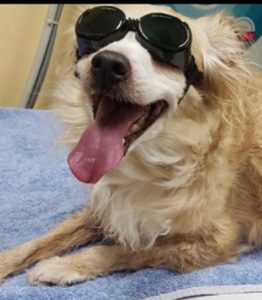 A scientifically proven way to reduce your pet’s pain and inflammation.
A scientifically proven way to reduce your pet’s pain and inflammation.
Photobiomodulation, commonly called laser therapy, targets your pet’s damaged cells and helps them regenerate faster.
Much like sunlight helps a plant produce energy, laser therapy helps energize your pet’s cells.
Eye Protection
Your pet, you, and the technician delivering the treatment will all wear eye protection during treatment. Make sure you snap a picture of your pet in their “Doggles”!
Treatment
A handpiece is passed over your pet’s injury. Depending on your pet’s condition, a contract or non-contact applicator will be used. There is no clipping or shaving of your pet’s fur.
Pet Experience
Your pet will feel a gentle soothing warmth as their pain is eased. Most pets are very relaxed during treatment, some even fall asleep.
RADIOLOGY (X-RAYS)
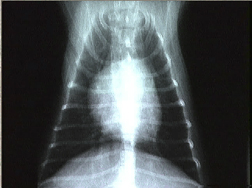 When we need to figure out what’s wrong with your pet, we routinely use x-rays to help identify the cause of the problem, rule out possible problems, or provide a list of possible causes. We may also use x-rays during a wellness exam to diagnose potential problems before they become serious.
When we need to figure out what’s wrong with your pet, we routinely use x-rays to help identify the cause of the problem, rule out possible problems, or provide a list of possible causes. We may also use x-rays during a wellness exam to diagnose potential problems before they become serious.
X-rays provide valuable information about a pet’s bones, gastrointestinal tract (stomach, intestines, colon), respiratory tract (lungs), heart, and genitourinary system (bladder, prostate). We use radiology alone or in conjunction with other diagnostic tools. Interpretation of radiographs requires great skill on the part of the veterinarian.
We are proud to offer digital radiology (x-rays that are captured digitally rather than on film). This state-of-the-art technology allows us to provide you with a quicker diagnosis for your pet. Plus, it uses less radiation than traditional x-rays.
To avoid a blurry image, pets need to remain completely still while an x-ray is taken. In some cases, we may need to sedate your pet or use short-acting general anesthesia.
If you have any questions about our radiology service or what to expect during your pet’s procedure, please don’t hesitate to ask.
FLEA CONTROL
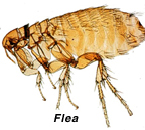 A flea problem on your pet means a flea problem in your home. Understanding the flea life cycle and methods for its control can be a daunting task. We will gladly assist you in this process. We can provide you with safe, effective flea prevention and if necessary, flea treatment. See the flea article in the Pet Health Library of our site.
A flea problem on your pet means a flea problem in your home. Understanding the flea life cycle and methods for its control can be a daunting task. We will gladly assist you in this process. We can provide you with safe, effective flea prevention and if necessary, flea treatment. See the flea article in the Pet Health Library of our site.
ULTRASONOGRAPHY
 Ultrasonography (also called ultrasound or sonography) is a non-invasive, pain-free procedure that uses sound waves to examine a pet’s internal organs and other structures inside the body. It can be used to evaluate the animal’s heart, kidneys, liver, gallbladder, and bladder; to detect fluid, cysts, tumors, or abscesses; and to confirm pregnancy or monitor an ongoing pregnancy.
Ultrasonography (also called ultrasound or sonography) is a non-invasive, pain-free procedure that uses sound waves to examine a pet’s internal organs and other structures inside the body. It can be used to evaluate the animal’s heart, kidneys, liver, gallbladder, and bladder; to detect fluid, cysts, tumors, or abscesses; and to confirm pregnancy or monitor an ongoing pregnancy.
We may use this imaging technique in conjunction with radiography (x-rays) and other diagnostic methods to ensure a proper diagnosis. Interpretation of ultrasound images requires great skill on the part of the clinician.
The ultrasonographer applies gel to the surface of the body and then methodically moves a transducer (a small handheld tool) across the skin to record images of the area of interest. The gel helps the transducer slide more easily and create a more accurate visual image.
The transducer emits ultrasonic sound waves, which are directed into the body toward the structures to be examined. The waves create echoes of varying degrees depending on the density of the tissue and the amount of fluid present. Those waves create detailed images of the structures, which are shown on a monitor and recorded for evaluation.
Ultrasound does not involve radiation, has no known side effects, and doesn’t typically require pets to be sedated or anesthetized. The hair in the area to be examined usually needs to be shaved so the ultrasonographer can obtain the best result.
If you have any questions about our ultrasonography service or what to expect during your pet’s procedure, please don’t hesitate to ask.
FLEA PREVENTION & CONTROL
FLEA PREVENTION AND CONTROL
 Fleas can cause problems for pets ranging from minor to life-threatening. Not only can these parasites cause severe itching, irritation, and allergies, but they can also transmit tapeworms and diseases. Fleas can infest dogs, cats, ferrets, mice, and rats. And fleas don’t just stay on pets; they can bite people, too. For more information, contact us or see the flea article in the Pet Health Library on our site.
Fleas can cause problems for pets ranging from minor to life-threatening. Not only can these parasites cause severe itching, irritation, and allergies, but they can also transmit tapeworms and diseases. Fleas can infest dogs, cats, ferrets, mice, and rats. And fleas don’t just stay on pets; they can bite people, too. For more information, contact us or see the flea article in the Pet Health Library on our site.
You don’t want these blood-sucking parasites on your pet or in your home. We can help keep them away or help you get rid of them if they’ve already found their way inside. Call us to find out how to eliminate and control fleas or to start your pet on a preventive today.
HEARTWORM PREVENTION
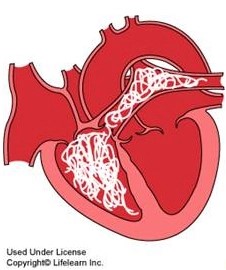 When they bite, mosquitoes can transmit heartworm infection. And those heartworms can wreak havoc on your dog or cat. These parasites can severely and sometimes fatally damage the heart, lungs, and blood vessels. Some pets may not show any signs of infection; in those that do, symptoms can vary widely.
When they bite, mosquitoes can transmit heartworm infection. And those heartworms can wreak havoc on your dog or cat. These parasites can severely and sometimes fatally damage the heart, lungs, and blood vessels. Some pets may not show any signs of infection; in those that do, symptoms can vary widely.
In dogs, signs of heartworm disease can range from coughing, fatigue, and weight loss to difficulty breathing and a swollen abdomen (caused by fluid accumulation from heart failure). Canine heartworm infection can also lead to a life-threatening complication called “caval syndrome” (a form of liver failure); without prompt surgical intervention, this condition usually causes death.
Although often thought to not be susceptible to heartworm infection, cats can indeed get heartworms. Cats can suffer from a syndrome referred to as heartworm-associated respiratory disease (HARD); the symptoms can be subtle and may mimic those of asthma or allergic bronchitis. Signs of respiratory distress, such as rapid or difficult breathing, wheezing, and panting, are common. Other symptoms include coughing, vomiting (typically unrelated to eating), and loss of appetite or weight. Heartworm infection is more difficult to diagnose in cats than it is in dogs.
Treatment for heartworm infection is far more expensive than prevention—and it can actually kill your dog. There is no approved treatment for cats. Some cats spontaneously rid themselves of the infection; others might not survive it. And even one or two adult heartworms in a cat can cause serious problems.
Fortunately, there’s an easy way to keep your dog or cat safe: by administering monthly heartworm preventives. Most heartworm medications also protect your pet against other parasites, such as roundworms, hookworms, whipworms, ear mites, fleas, and ticks. We can recommend the best regimen of prevention for your pet.
TICK PREVENTION
 Ticks are becoming more and more prevalent in North America, and they’re now being found in areas where people and pets didn’t previously encounter ticks. These parasites aren’t just a nuisance; they can cause serious—and sometimes deadly—diseases, including Lyme disease, Rocky Mountain spotted fever, babesiosis, ehrlichiosis, and tick paralysis. Contact us immediately if your pet starts coughing or has joint pain, trouble breathing, fever, weakness, or loss of appetite, weight, energy, or coordination.
Ticks are becoming more and more prevalent in North America, and they’re now being found in areas where people and pets didn’t previously encounter ticks. These parasites aren’t just a nuisance; they can cause serious—and sometimes deadly—diseases, including Lyme disease, Rocky Mountain spotted fever, babesiosis, ehrlichiosis, and tick paralysis. Contact us immediately if your pet starts coughing or has joint pain, trouble breathing, fever, weakness, or loss of appetite, weight, energy, or coordination.
The best method for keeping ticks off your pet is by keeping your dog or cat on a tick preventive. Even indoor-only pets are at risk because ticks can hitch a ride inside on your clothing or shoes. Tick preventives are safe and highly effective at controlling ticks and the diseases they carry. Call us to get your pet protected today!
Don’t panic if you find a tick on your dog or cat, even if your pet is on a preventive. Some preventives kill ticks after they’ve come in contact with your pet. Ticks can hide easily under your pet’s fur, so as an added measure of protection, we recommend checking your pet for ticks every time your pet comes in from outside. And don’t hesitate to ask us any questions you might have.
SURGICAL SERVICES
SPAYING
 Spaying your pet has many benefits. The procedure, which prevents female animals from becoming pregnant and reproducing, can help your dog or cat live a longer, healthier life. Spaying will not change your pet’s personality.
Spaying your pet has many benefits. The procedure, which prevents female animals from becoming pregnant and reproducing, can help your dog or cat live a longer, healthier life. Spaying will not change your pet’s personality.
By spaying your female pet, you’re protecting her against potentially deadly diseases, including bacterial infections, reproductive tract diseases, and several types of cancer. You also won’t have to worry about her going into heat. This means avoiding the mess that often accompanies the heat cycle in female dogs and the pacing and crying that happens with female cats. In addition, spaying your pet will help control the dog and cat overpopulation problem, keeping more animals out of shelters.
Spaying, which involves removing the ovaries and uterus, is a surgical procedure and does need to be performed with the pet under anesthesia. We follow strict protocols and continually monitor your pet’s vital signs to help ensure her safety. Please see the descriptions under Anesthesia and Patient Monitoring for more information on what we do to keep your pet safe.
To set up an appointment to have your pet spayed or to learn more about this procedure, call or visit our clinic. If you are struggling with the decision of whether to spay your pet, please call us so we can discuss your concerns.
NEUTERING
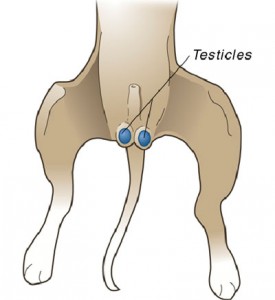 Neutering your pet has many benefits. The procedure, which prevents male animals from reproducing, can help your dog or cat live a longer, healthier life. Neutering will not change your pet’s personality.
Neutering your pet has many benefits. The procedure, which prevents male animals from reproducing, can help your dog or cat live a longer, healthier life. Neutering will not change your pet’s personality.
By neutering your pet, you’re reducing or eliminating his risk for prostate and testicular cancer, as well as sexually transmitted diseases. Neutering will also reduce or eliminate undesirable and embarrassing behavior, including roaming, fighting, humping, and spraying. In addition, neutering your pet will help control the dog and cat overpopulation problem, keeping more animals out of shelters.
Neutering, which involves removing the testicles, is a surgical procedure and does need to be performed with the pet under anesthesia. We follow strict protocols and continually monitor your pet’s vital signs to help ensure his safety. Please see the descriptions under Anesthesia and Patient Monitoring for more information on what we do to keep your pet safe.
To set up an appointment to have your pet neutered or to learn more about this procedure, please call or visit our clinic. If you are struggling with the decision of whether to neuter your pet, please call us or stop by so we can discuss your concerns.
SOFT TISSUE SURGERY
 We perform many types of soft tissue surgeries at our clinic. Soft tissue surgeries are those that are not associated with bone. These surgeries can provide many benefits to pets.
We perform many types of soft tissue surgeries at our clinic. Soft tissue surgeries are those that are not associated with bone. These surgeries can provide many benefits to pets.
Probably the most common soft tissue surgery performed on pets is the removal of masses, or lumps. Most of these masses, once removed and tested, are found to be benign (nonharmful); however, occasionally they are more serious. Early removal and accurate diagnosis of a lump is necessary to improve the outcome in your pet if the mass is cancerous.
If your dog suffers from frequent ear infections, surgical intervention can reduce their occurrence by improving airflow into the ear canal.
Surgery can also help resolve several problems related to the eyes. Tearing in your pet’s eyes can mean an infection is present or may be a sign that the cornea (outer layer of the eye) has been damaged. Surgery may allow the cornea to heal faster with less scarring, improving your pet’s ability to see. In some pets, the eyelashes may actually damage the cornea. Surgical intervention improves comfort in these pets, reduces the chances of corneal scarring, and enhances the pet’s vision in the long term.
Please contact us if you’d like to discuss how soft tissue surgery might be able to help your pet.
WELLNESS & VACCINATION PROGRAMS
PUPPY WELLNESS
 Congratulations on your new puppy! Thank you for choosing us to help protect and care for your new addition to your family.
Congratulations on your new puppy! Thank you for choosing us to help protect and care for your new addition to your family.
Our puppy wellness program is designed to help get your puppy started on the right path to a long and healthy life. The first few months are a critical period in your puppy’s development, and we can give you the support and tools necessary to help him or her grow into a well-mannered, healthy dog, including information and advice on nutrition, training, behavior, and socialization.
Schedule your puppy for his or her first exam as soon as possible. Until your puppy has received a series of vaccines, he or she is susceptible to many serious but preventable diseases. We will make sure your new dog is protected against rabies, distemper, and parvovirus, among other diseases. Your puppy will also need to be tested and treated for parasites, which are extremely common in young dogs.
Most puppies have roundworms, which are intestinal worms that can cause vomiting, diarrhea, and other gastrointestinal signs (although dogs can have worms without showing any symptoms). It is important for puppies to be treated for roundworms, not only to rid them of the infection but also to prevent you and the rest of your family from becoming infected. Roundworms are a zoonotic parasite, which means they can be transmitted from pets to people. By ensuring that your puppy is properly treated, you can keep your entire family safe from these and other parasites.
We look forward to meeting your new puppy! Schedule your appointment today.
KITTEN WELLNESS
 Congratulations on your new kitten! Thank you for choosing us to help protect and care for your new addition to your family.
Congratulations on your new kitten! Thank you for choosing us to help protect and care for your new addition to your family.
Our kitten wellness program is designed to help get your kitten started on the right path to a long and healthy life. The first few months are a critical period in your kitten’s development, and we can give you the support and tools necessary to help him or her grow into a well-mannered, healthy cat, including information and advice on nutrition, litterbox training, and behavior.
Schedule your kitten for his or her first exam as soon as possible. Until your kitten has received a series of vaccines, he or she is susceptible to many serious but preventable diseases. We will make sure your new pet is protected against rabies and panleukopenia (distemper). Depending on your cat’s risk, we may also advise vaccinating him or her against other diseases, such as feline leukemia virus (FeLV) and feline immunodeficiency virus (FIV). In addition, your kitten will need to be tested and treated for parasites, which are common in young cats.
Most kittens have roundworms, which are intestinal worms that can cause coughing, weight loss, and a potbellied appearance in cats (although they may not cause any symptoms). It is important for kittens to be treated for roundworms, not only to help rid them of the infection but also to prevent you and the rest of your family from becoming infected. Roundworms are a zoonotic parasite, which means they can be transmitted from pets to people. By ensuring that your kitten is properly treated, you can keep your entire family safe.
We look forward to meeting your new kitten! Schedule your appointment today.
ADULT PET WELLNESS
 Bringing your pet in for an annual diagnostic and wellness checkup can help reassure you that your dog or cat is healthy or help us detect hidden diseases or conditions early. Early detection can improve the prognosis of many diseases, keep medical costs down, and help your pet live longer. Many dogs and cats are good at hiding signs that something is wrong, so subtle changes in their health or behavior might be easy to overlook. And, depending on the disease, some pets don’t show any symptoms.
Bringing your pet in for an annual diagnostic and wellness checkup can help reassure you that your dog or cat is healthy or help us detect hidden diseases or conditions early. Early detection can improve the prognosis of many diseases, keep medical costs down, and help your pet live longer. Many dogs and cats are good at hiding signs that something is wrong, so subtle changes in their health or behavior might be easy to overlook. And, depending on the disease, some pets don’t show any symptoms.
Dogs and cats age far quicker than humans, so it is even more crucial for our companion animals to receive regular exams. In addition, the risks of arthritis, cancer, diabetes, heart disease, hormone disorders, and kidney and liver problems all increase with age.
During your pet’s wellness exam, we will perform a physical assessment, checking your dog or cat from nose to tail. We will also make sure your pet receives appropriate vaccinations and preventives. We will perform a diagnostic workup, which may include blood, fecal, and urine tests to check for parasites and underlying diseases. We may also recommend that your pet receive dental care. When your pet is nearing his or her senior years, we will recommend a baseline exam and diagnostic workup so we’ll know what’s normal for your pet. This will enable us to keep track of any changes.
Because you spend the most time with your pet, you are your pet’s expert, as well as his or her greatest advocate. Please let us know if you’ve noticed any physical or behavioral changes in your pet, as well as any other concerns you might have.
Call us today to schedule your pet’s exam! If you have any questions, we would be happy to discuss our adult wellness program in more detail.
SENIOR PET WELLNESS
 As dogs and cats get older, they need more attention and special care. Our senior wellness program can help your pet remain fit and healthy as he or she ages and help us catch any potential problems earlier when they’re easier to treat or manage. Regular veterinary exams can actually help your pet live longer, too!
As dogs and cats get older, they need more attention and special care. Our senior wellness program can help your pet remain fit and healthy as he or she ages and help us catch any potential problems earlier when they’re easier to treat or manage. Regular veterinary exams can actually help your pet live longer, too!
